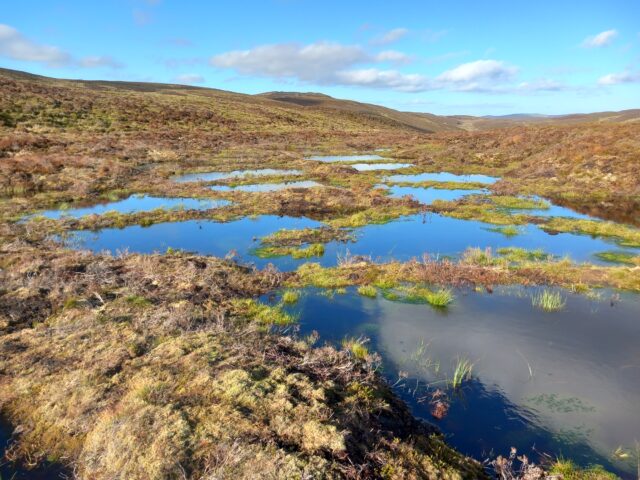Driving change in the food and farming sector – for peat’s sake!
Co-op and the Co-op Foundation to fund organisations innovating to grow food without damaging UK peatlands

A mushroom farm using worms to develop a new type of compost and an organisation using algae to replace peat in compost have both been awarded funding from round three of the Co-op Foundation’s £3.5m Carbon Innovation Fund (CIF) partnership with Co-op.
Rhyze Mushrooms Co-op CIC has received £148,200 to develop compost using worms that is easily replicable and at a large enough scale to be used on farms. This method would make it possible for market gardens to produce their own high-quality peat-free compost to grow vegetables.
At the same time, Algae Products International Ltd has been awarded £150k to develop soil additives from algae, without using peat or emitting carbon. These soil additives could then be used for fertiliser, or even as alternatives to grazing for animals.
These organisations are just two of seven Carbon Innovation Fund partners that are innovating new ways to produce food without damaging our precious UK peatlands. Peatlands are some of the most carbon-rich ecosystems on earth, storing twice as much carbon as the world’s forests. They help to cool the planet, support biodiversity and reduce the risk of flooding. Peatland is often drained for things like growing crops and broken up to put the peat into compost because it’s so nutrient-rich. This degradation of peatland causes greenhouse gas emissions, biodiversity loss and destroys some of the UK’s most important ecosystems.
The Carbon Innovation Fund is the largest environmental partnership between Co-op and its charity, the Co-op Foundation, and round three of funding specifically looked to support projects working to grow the food we need without damaging peatlands. It’s funded by Co-op donations from the sale of compostable carrier bags in the UK, as well as the Foundation’s own funds.
Nick Crofts, CEO of the Co-op Foundation said:
“As we announce the third round of partners for the Carbon Innovation Fund, I’m struck by the ingenuity and creativity of the projects we are funding. We need to co-operate to find solutions to the climate and nature crisis we face. Our partners’ brilliant ideas and innovation for harnessing the power of nature without harming it are vital to build a food system that restores and protects important habitats like peatland.”
Cathryn Higgs, Head of Ethics, Sustainability & Policy at Co-op said:
“We are delighted that the sales of our Co-op compostable carrier bags continue to fund the Carbon Innovation Fund. Protecting and restoring UK peatlands is critical to Co-op’s Climate Plan and this Fund enables deeper impact through new innovative partnerships to produce delicious food while reducing our carbon impact and protecting nature.”
Other new Carbon Innovation Fund partners include:
- Lancashire Wildlife Trust, which has received £148,181 to develop pioneering sustainable techniques for growing food crops on peat soils. By growing on peatland that’s more saturated with water, they hope to reduce greenhouse gas emissions whilst maintaining economically viable food production.
- Tagsa Uibhist which has received £149,438 to support the development of a more local food system on Uist in the Outer Hebrides in a way that will protect the peatland in the area. This will not only alleviate food insecurity, but also protect peatlands and their fragile Western Isles ecosystem.
- Derbyshire Wildlife Trust which has received £81,831 to work with farmers to develop action plans on how to maintain or improve their farm’s income and calorie output, while delivering lowland peatland restoration and sustainable farming.
- Wildlife Trust BCN which has received £150k to test new ways to sow, manage and monitor crops sustainably on peatlands and test their suitability as food for livestock. This will demonstrate wet farming techniques that can be scaled up if needed, all while protecting peat soils.
- Criw Compostio which has received £122,957 for their 3-year project which looks to de-mystify food waste management, regulation and processing and create a unique peat-free compost for the community.
In 2021 Co-op became the first UK supermarket to completely end the sale of peat-based bagged compost in all its stores. Last year, Co-op also announced a three-year partnership with the RSPB, donating a £1million from the sale of its compostable carrier bags to the charity to aid with their peatland restoration projects. This funding builds upon Co-op’s commitment to the UK’s peatlands.
It also builds upon the Foundation’s plan to create more sustainable communities, as part of its current strategy. Round three of the Carbon Innovation Fund follows on from £1.4m of grant-giving in round one, and over £1m in round two of the funding partnership.
The Co-op Foundation is Co-op’s charity and it believes cooperation is at the heart of strong communities. It’s Building communities of the future together’ strategy is helping the team deliver on Co-op’s vision of ‘Co-operating for a fairer world.
Sign up to the Co-op Foundation blog to hear first when new funding is announced.